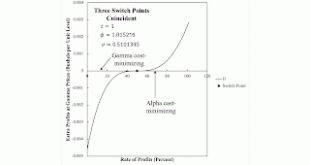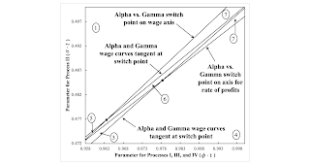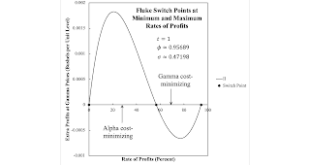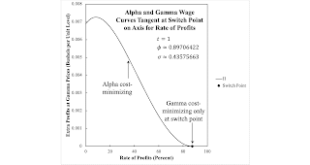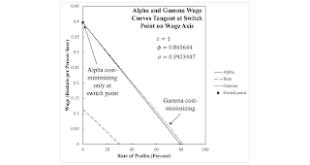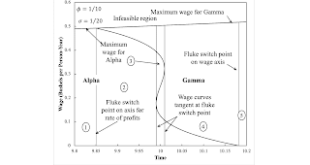Figure 1: Extra Profits at Gamma Prices for the Sixth Double-Fluke Switch Point This post is a continuation of this series of posts. In the last double-fluke case, the three switch points between Alpha and Gamma coincide as a ingle switch point. Figure 1 illustrates, while Figure 2 depicts how the parameter space is partitioned around this double-fluke case. Region 7, in which one switch point occurs, is connected. At the point corresponding to the double-fluke case, the two boundaries...
Read More »The History Of No-Longer-Existing Socialism Validates Marx
Marx, like Adam Smith and Walt Rostow, had a stages theory of history. Feudalism was succeeded by capitalism, and capitalism is to be succeeded by socialism. Socialism is to arise first in the most advanced capitalist countries. (The theory of history is not my favorite part of Marxist theory.) Russia, in 1917, was a semi-feudal country with peasants as the largest class. I guess China was the same, before Mao. A Marxist would not expect socialism to be successful in either country. I...
Read More »A Fourth And Fifth Double-Fluke Switch Point For A Triple-Switching Example
Figure 1: Partitions of the Parameter Space Around the Double-Fluke Switch Points This post is a continuation of this series of posts. The fourth and fifth double-fluke cases, in order of an increasing φ t, are symmetrical. The fourth case has two switch points between Alpha and Gamma. One is on the wage axis. The wage curves are tangent at the other switch point, at a positive rate of profits below the maximum. Alpha is cost-minimizing at all feasible rates of profits. Gamma is...
Read More »A Third Double-Fluke Case For A Triple-Switching Example
Figure 1: Extra Profits at Gamma Prices for the Third Double-Fluke Switch Point This post is a continuation of this series of posts. The next double-fluke case to be considered arises for parameters on intersection of the upper and lower boundaries of regions 3 and 5. Figure 1 illustrates this case, while Figure 2 depicts local perturbations of this double-fluke case. Perturbations that lead to either of the switch points at the extremes of the rate of profits no longer being at a feasible...
Read More »Why Is Marginalist Economics Wrong?
Because of its treatment of capital. Other answers are possible. This post draws heavily on the work of Pierangelo Garegnani. I start with a (parochial) definition of economics: "Economics is the science which studies human behavior as a relationship between ends and scarce means which have alternative uses." -- Lionel Robbins (1932) The scarce means are the factors of production: land, labor, and capital. Land and labor are in physical terms, in units of acres and person-years,...
Read More »A Second Double-Fluke Switch Point For A Triple-Switching Example
Figure 1: Extra Profits at Gamma Prices for the Second Double-Fluke Switch Point This post is a continuation of this series of posts. A switch point in which wage curves are tangent on the axis for the rate of profits is a double-fluke case symmetrical to the double-fluke case in the previous post. As shown in Figure 1, this case arises in this example as well. The roles of the Alpha and Gamma techniques are reversed. Alpha is always cost-minimizing, while Gamma is cost-minimizing only at...
Read More »Machinery And The Honesty Of David Ricardo
Consider the introduction of new, advanced machinery into a capitalist economy. This will raise productivity and be good for the population as a whole. It will displace workers, at least temporarily, who were previously making the product of the machine with handicraft production or now obsolete machines with lower productivity. But the production of the machines requires workers too. So, ignoring short-run frictions, will the workers not remain as well off? David Ricardo believed...
Read More »A Double-Fluke Switch Point For A Triple-Switching Example
Figure 1: The Wage Frontier for a Double-Fluke Switch Point This post is an expansion of a previous one. That post defines the technology and the price system for the three techniques conprising the technology. In Alpha, labor and corn inputs are used to produce corn. Beta and Gamma are more roundabout. In each, Labor and corn are first used to make a machine that lasts two years and can be used to produce corn each year. In Beta, the machine is discarded after being operated one year. The...
Read More »A Robinsade For Austrian Capital Theory
I take the following long quote from Bohm-Bawerk. "The entire sum of originary productive forces at Crusoe’s disposal … is a day’s labor which we shall assume to be a 10-hour workday… Let us assume that the fruit harvest [is] enough to enable our castaway to gather the subsistence minimum in nine hours a day, and enough in 10 hours to furnish him with adequate sustenance for complete health and vigor... Crusoe now has a choice between two lines of conduct. One alternative is ... to...
Read More »A 1D Diagram For A Triple-Switching Example
Figure 1: Triple Switching with Strucutral Economic Dynamics1.0 Introduction I have been using fluke switch points to partition two-dimensional slices of parameter spaces. I know, I think, how reswitching can appear and disappear. But I am confused how more switch points can appear. So this post is a start on exploring a triple-switching example. I have stumbled upon two examples of triple-switching, so to speak. I have not yet replicated Steedman's claim that triple-switching can arise...
Read More » Heterodox
Heterodox

